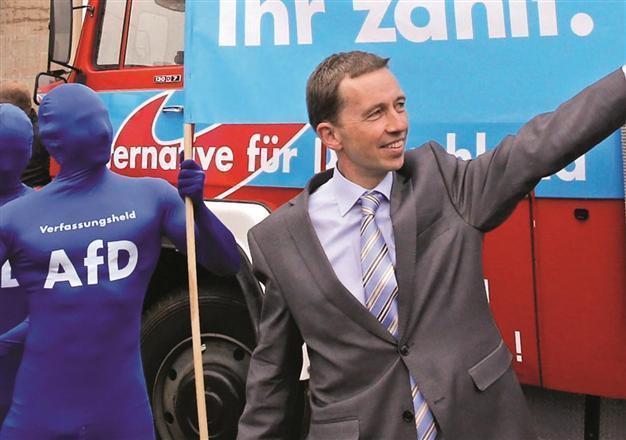Anti-euro party close to Bundestag: Survey
BERLIN

File photo of Bernd Lucke, the leader of the euro-critical Alternative fuer Deutschland (AfD) gesturing in front of a campaign poster during an election campaign rally in Berlin September 16, 2013. REUTERS/Fabrizio Bensch/Files
A German anti-euro party has attracted the support of 5 percent of the country’s population, high enough to put it into the Bundestag for the first time ever, a new poll has showed.The poll, conducted after last week’s state election in Bavaria, gave the euroskeptic Alternative for Germany (AfD) 5 percent, the amount needed to enter the Bundestag lower house, according to the INSA poll for daily Bild, which was released yesterday.
If the AfD succeeds in entering Parliament in Sept. 22’s election, it could upset Chancellor Angela Merkel’s hopes of continuing her current center-right coalition.
The poll put Merkel’s conservatives at 38 percent and her Free Democratic (FDP) allies at 6 percent, giving a combined total of 44 percent, one percentage point lower than the total for the three left-of-center parties.
The opposition Social Democrats (SPD) polled at 28 percent, the Greens at 8 percent and the far-left Die Linke at 9 percent.
The AfD, created in February, advocates an “orderly breakup” of the eurozone but may also draw socially conservative protest voters. The specter of a third international bailout for Greece unleashed by Germany’s respected finance minister last month put wind in the party’s sails amid voter unease over how much more Berlin will have to fork out in eurozone aid.
Riding a tailwind, the AfD said it received 430,000 euros in donations from 6,000 people in 48 hours after an online appeal for support at the weekend. The AfD’s TV campaign ad was viewed by 1 million viewers on YouTube, the party said. Pollsters, analysts and politicians have expressed concerns that support for the AfD, popular on the far right because of its tough stance on immigration, could be even higher as its supporters might conceal their true intentions from pollsters.
Merkel, however, has ruled out a coalition with the AfD. “It’s not even a question,” she bluntly told Bild, while key party ally Volker Kauder dismissed the AfD as having “no real program.” AfD’s core members reportedly consist of middle-class voters, academics and business figures.
















